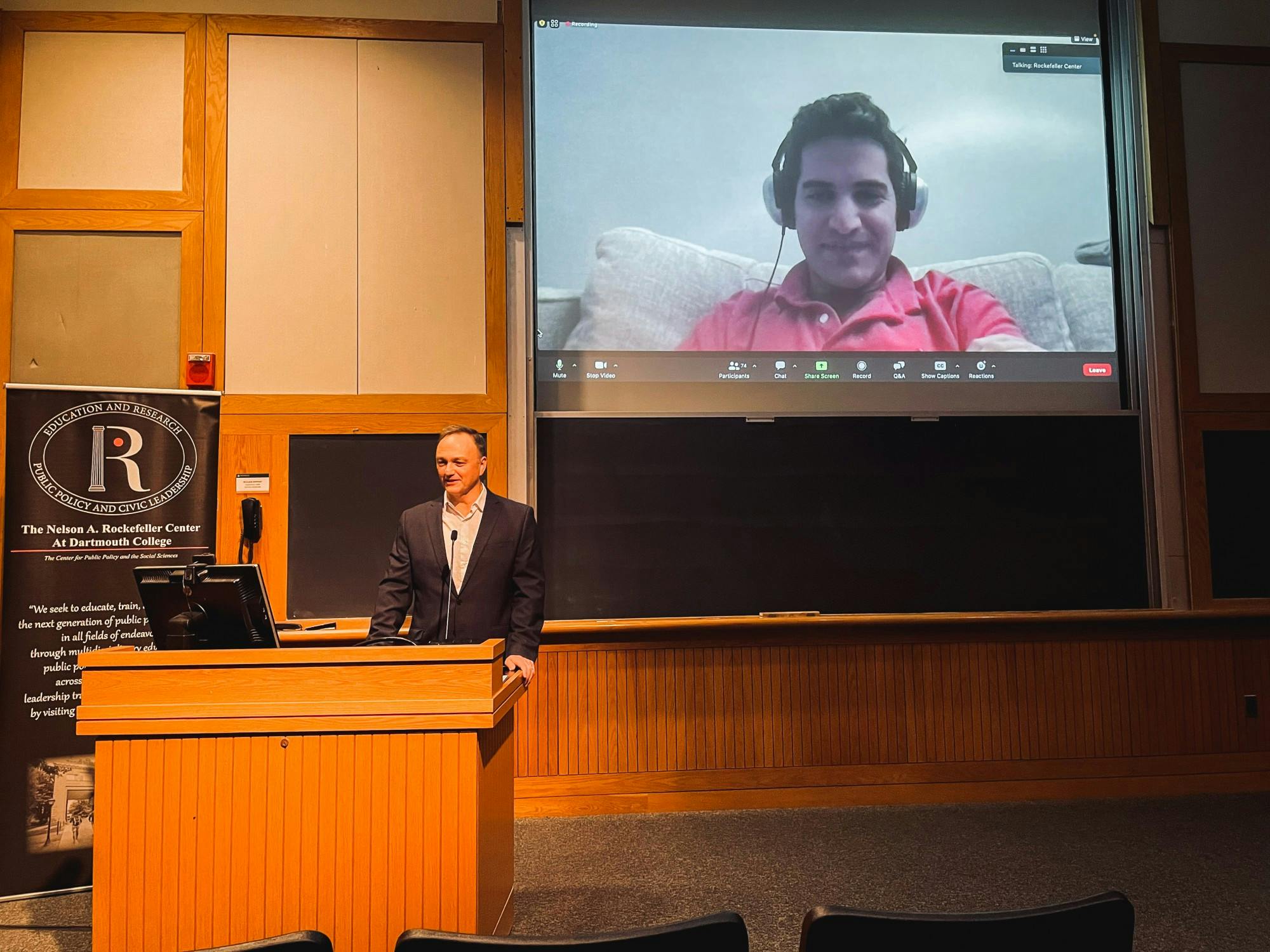On Oct. 25, the Rockefeller Center for Public Policy partnered with the University of New Hampshire’s Carsey School of Public Policy to co-host an event with Harry Enten ’11, a senior data reporter for CNN. Enten spoke about his experiences as an analyst and reporter, answered questions about the state of American politics and offered his insights about the upcoming midterm elections.
Both schools hosted their own in-person audiences while those unable to attend were able to join over Zoom. Enten, who was not present on either campus, spoke via Zoom from New York City.
Approximately 30 students and community members were present for the College’s in-person event, with another 60 online, program officer for public programs and special events Joanne Blais said. Government professor Dean Lacy, one of the event’s hosts, gave opening remarks for Enten, who had been one of his students.
“I love it when students get passionate about [studying politics] and decide to make it their career,” Lacy said after the event. “I think it’s great for Dartmouth students to see someone who was in their shoes…10 years ago.”
Enten opened with remarks about his experiences in politics and the ultimate uncertainty of polling. Recalling his account of the 2008 New Hampshire Democratic primary, in which Hillary Clinton pulled off an upset win against Barack Obama, Enten said that witnessing the surprise win as a Dartmouth student was a turning point for his interest in polling.
“That event and that primary sort of led me on this road to realizing that while there’s a lot we do know about politics, there’s in fact a lot that we don’t know about politics,” Enten said. “And I think that’s something we have seen over the last six years [with Donald Trump] — the last seven years, really — in American politics.”
Enten then shifted his focus to the 2016 presidential election and the failure of many pollsters to predict Trump’s victory. Enten, who worked for the opinion poll analysis website FiveThirtyEight at the time, said he made several mistakes during the campaign but was “proud” of being part of a team that had given Trump a one-third chance of capturing the White House — much higher than the odds calculated by other pollsters.
“If you take nothing else from all of this, it’s okay to discuss the different possibilities for different races, and it’s okay to be humble,” he said. “It’s okay not to be a know-it-all.”
Enten said that regardless of the outcomes of the midterm elections, he expects voters to turn out in close to or exceeding record numbers. As an analyst, Enten said he has been “blessed” by the competitiveness of the past few presidential elections, but he also said that the nation has become increasingly polarized.
“I have no reason at this point to know how 2024 will go, but this is honestly the most polarized we’ve been as a country since arguably the 1880s,” he said.
After approximately 15 minutes, the event transitioned into a Q&A between Enten and the hosts. Lacy and UNH professor Emily Baer asked a number of questions surrounding the upcoming midterm elections on Nov. 8 and the predictions that Enten was able to offer.
While stressing the uncertainty of his electoral forecasts, Enten said that he believes Republicans will gain control of the House of Representatives with a net gain of between 15 and 30 seats; the GOP needs a net gain of five seats to earn a majority in the chamber, he added.
JJ Byrne ’26, who attended the event, said that he had previously watched Enten on CNN and thought of him as “fair and data-driven.”
Regarding the Senate, Enten said the outcome was “a far more interesting ballgame” and would come down to key races in Arizona, Georgia, Nevada and Pennsylvania. In recent weeks, Enten said, Republican candidates for Senate have largely gained in the polls.
“If the election were held today, I think it’d probably be a toss-up, maybe a slight tilt towards the Democrats,” he said. “But the truth is, when you’re dealing with two- or three-point leads in a lot of these states, I don’t think you can really make a safe call one way or another.”
The factor that will most determine Democrats’ success in the election will be whether or not candidates can “outrun Joe Biden” and win over voters who disapprove of the president, Enten said. For example, according to RealClearPolitics, Biden has a 43.1% approval and 53.8% disapproval rating.
The final part of the event — in which Enten fielded questions from in-person and online audience members — featured topics ranging from potential 2024 presidential candidates to national voting patterns.
In response to a question about education polarization and how voters without college degrees are moving further to the right, Enten said parties “play the game that’s on the board” — meaning that parties work to gain majorities based on the electoral college and senate apportionment systems. American electoral politics requires coalition-building, and most majorities eventually “flitter away,” he added.
“And if all of a sudden we went to a system…that had a nationwide popular vote [instead of the Electoral College], then Republicans and Democrats would run different campaigns,” Enten said.
Kyle Immel ’22, who attended the event and said that he follows political polling, said he “really appreciated” listening to Enten’s opinions, particularly on voting trends.
“I think I hadn’t really thought of it in the way that the parties tend to adjust their messages down the line to work with, as he said, ‘the rules of the game,’” Immel said. “And then 10 years down the line, we’re in a different place than we thought we were [going to] be.”




